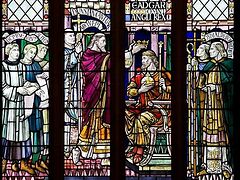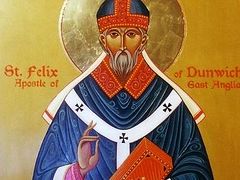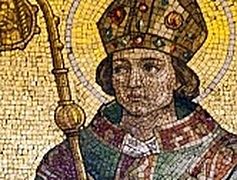Beltsville, Maryland, November 19, 2020
On Sunday, November 8, St. Alfred, King of the Anglo-Saxons from 886 until his death in 899, was liturgically commemorated at Holy Apostles Church in Beltsville, Maryland, a parish of the Russian Orthodox Church Outside of Russia.
It was “perhaps the first Orthodox parish in North America to celebrate the commemoration of Holy Right-Believing Alfred, King of England,” reports the Eastern American Diocese of ROCOR.
On August 21, 2007, the Holy Synod of the Russian Church officially approved the veneration of all the saints who shone forth in the lands of Britain and Ireland, blessing the annual celebration of their memory on the third Sunday after Pentecost. This feast is in honor of all the saints who lived in England, Ireland, Wales and Scotland until 1054, including St. Alfred, known as “the Great.”
The Divine Liturgy was celebrated by Archpriest George Johnson and his son and assistant priest Fr. Christopher Johnson. Due to pandemic restrictions, the service was held outdoors, with 69 people present, including visitors from several other parishes.
“We hope that with our veneration of him we can begin to draw more Orthodox attention to this holy king, so that more and more of us can humbly ask his holy prayers before the Throne of the King of kings,” the parish said.
 Photo: eadiocese.org Following the Divine Liturgy, a moleben to St. Alfred was served, with a supplicatory prayer composed by Fr. Christopher:
Photo: eadiocese.org Following the Divine Liturgy, a moleben to St. Alfred was served, with a supplicatory prayer composed by Fr. Christopher:
A Prayer for the USA
O holy right-believing Alfred, great king of Wessex and father of the English nation, hear our supplication.
Thou hast shown us an indelible example of courage and faith in the marshes of Æthelney, when all England was suffering the depredation of the heathen Danes. Thou didst build up the defenses of thy kingdom as thou didst also strive to increase the Christian Faith in thy kingly heart, showing an example of true wisdom to friend and foe alike; enlightening thy people, showing mercy to thy vanquished foes, wisely preparing for war, but striving always for a holy peace.
Thou didst love learning and render into English many holy books, sending them out to all thy people, raising up their minds and hearts in the light of true knowledge. Thou didst renew the ancient laws of England, becoming a new Justinian, showing an example of the righteous judgement required by God of all who are in seats of power.
We, thy spiritual children in America, ask now thy strong intercession before the King of kings; help us in our time of trouble. Be like Elijah and grant us a double portion of thy spirit that thirsted after these virtues of courage, faith, steadfastness in the face of uncertainty and fear, the love of the Lord that bringeth holy wisdom, and righteous and merciful judgement in the fear of God.
O Alfred, wise king, do thou entreat Him to guide us steadily, as He guided thee, and to grant order, justice, peace, and tranquility to our native land.
In the name of the Father to Whom thou drawest nearer every day, the Son Whose love thou didst teach to all, and the Holy Spirit Who fillest thy heart, now and ever and unto the ages of ages. Amen.
The Eastern American Diocese provides details of his life worth emulating:
St. Alfred (born 849) was King of Wessex from 886 until his death on October 26 899. He was the fifth son of his father, Æthelwulf, and never expected to become king. He loved learning and loved the Lord Jesus Christ, and most likely looked forward to a life of contemplation in the Church. Such was not to be his fate.
He was thrust into kingship at the age of 22, during a time of near-constant serious threat from the heathen Viking Danes. Through much hardship and wise preparation, he defeated Guthrum the Dane in a decisive battle, ending the Viking threat for many years. As a term of the surrender, Guthrum received Holy Baptism as Æthelstan, along with 30 of his jarls (Danish noblemen), with Alfred himself standing as godfather to Guthrum and his men. This is an example of the justice and mercy of the saint, as he showed care for the souls of not only his own people, but his former enemies.
When he was finally able to rule in peace, he began a program of education, requiring that all of his Thegns and Aldermen (nobility) learn to read and write, and that all freemen of England teach their sons the same. He personally translated Boethius’ "Consolation of Philosophy" and St. Gregory’s "On Pastoral Care," among many other books, and had them propagated throughout his land, spreading the light of holy knowledge to all his people.




